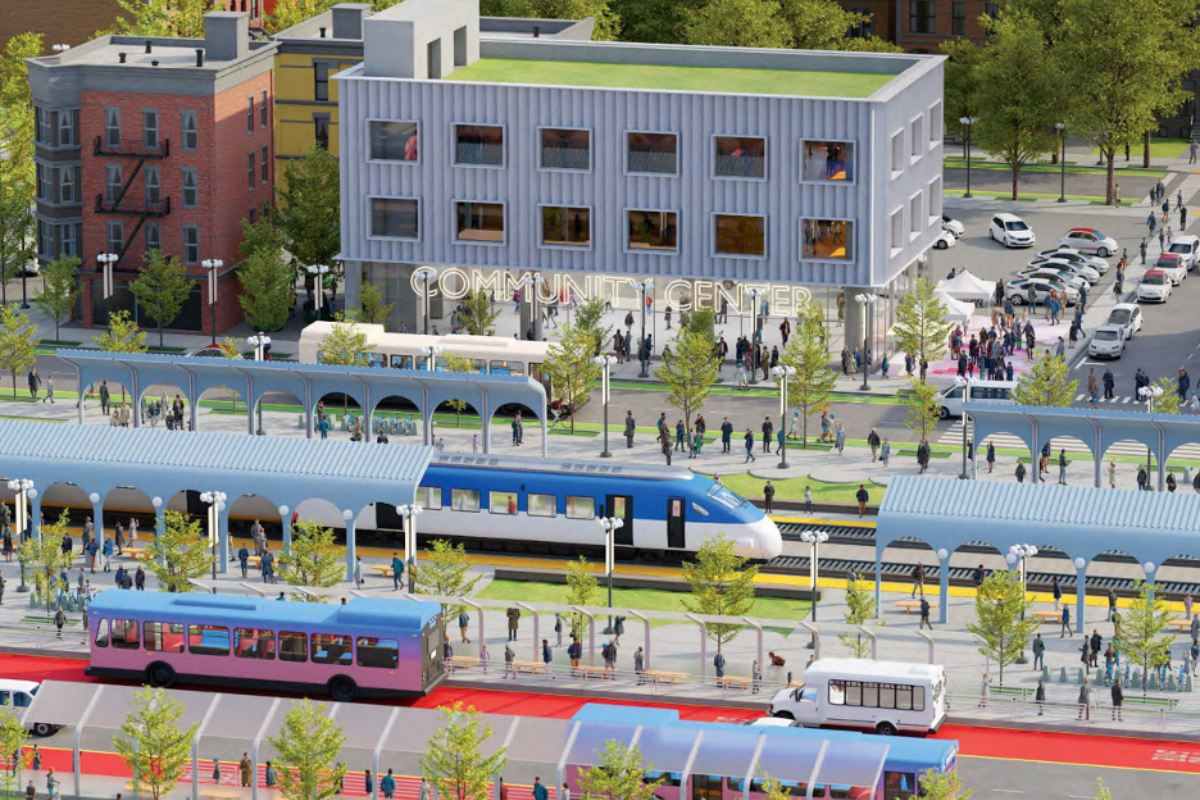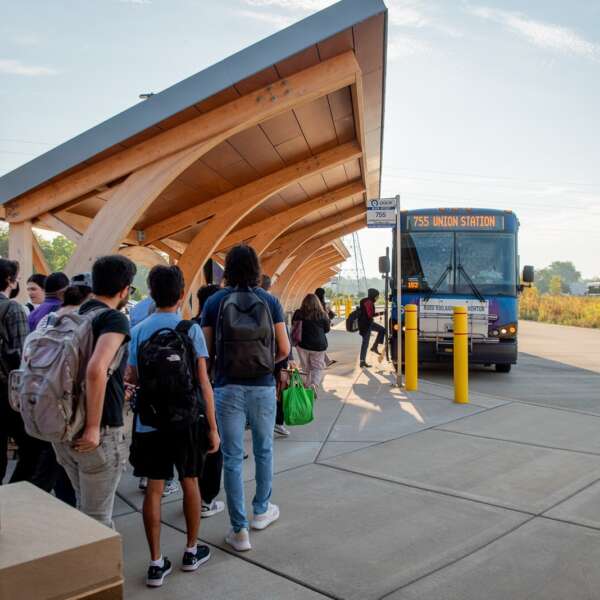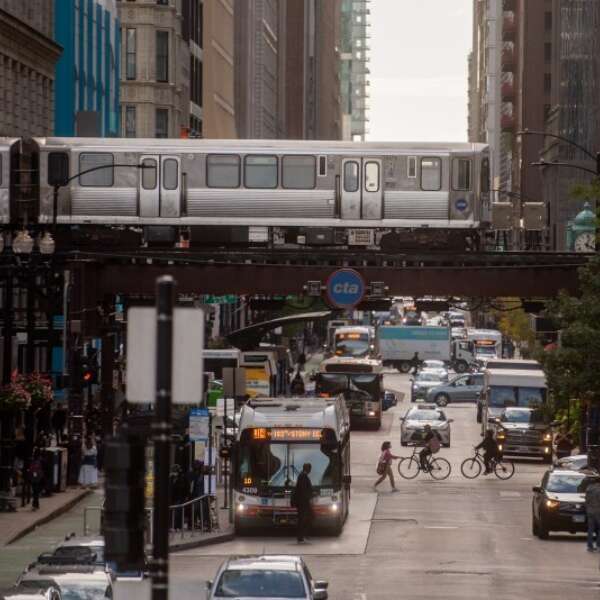RTA and partners working on Chicago region’s first Mobility Hub Network Framework
May 14, 2024
May 14, 2024

The RTA is partnering with the Shared Use Mobility Center (SUMC) and the Cook County Department of Transportation and Highways (DoTH) to develop the Chicago region’s first Mobility Hub Network Framework. The project kicked off in early May 2024, and the outcomes of the study will include a mobility hub framework and policy report for the entire six-county RTA service area, and to develop proposed Cook County mobility hub projects.
Mobility hubs are locations where people can access multiple types of transportation modes in a central location. Features may include adjacency to transit facilities like bus stops or rail stations; micromobility options like bike or scooter share, loading zones for ride hail vehicles like Uber, Lyft, and taxis; secured parking for car sharing, vanpool, and other types of shared vehicles; electric vehicle charging stations; and delivery lockers and mini-logistics hubs.
When existing community facilities and public services—for example, health clinics, daycares, senior centers, public libraries, etc.—are part of the mix, they can also create opportunities for bridging economic and digital divides in accessing services, serving a wider share of the public as well addressing issues of climate resiliency, equity, access, and affordability.

Cary Depot Plaza. Image: Village of Cary
The Mobility Hub Network Framework comes out of recent plans from Cook County and the RTA. Cook County’s Transit Plan recommends better access to transit which includes “…walking, riding bikes or scooters, taking paratransit or utilizing rideshare,” as well as “improving the quality of access and providing a variety of mobility options to extend the reach of transit.” The RTA’s Transit is the Answer strategic plan commits the agency to supporting planning and construction of mobility hubs in partnership with local communities. The Mobility Hub Network Framework is intended to serve as a guide for how Cook County, the collar counties, and other regional entities can develop and invest in new community assets that address climate change, equity, access, and affordability.
The framework itself will assist agencies and communities throughout the six-county area in determining where to locate mobility hubs and will provide a structure for approaching site and design choices in collaboration with local community members, businesses, and other key stakeholders centering equity and access to opportunity. Anchored by a synthesis of existing efforts across the region, the framework will develop a decision structure, core principles, and guidance for the creation of a network of mobility hubs prioritized according to the goals set out in the region’s key policy documents. Building on related initiatives already underway (which may not explicitly use the term mobility hub), the framework will leverage the region’s existing transportation assets and plans, demand-management approaches, and expertise, and be guided by community needs, particularly those of historically underserved populations. The business and logistical needs of public and private mobility operators and related services will also help inform discussion and planning.
Development of the framework will include meetings with SUMC, Cook County DoTH, RTA, and other stakeholders. Research around best practices from elsewhere in the U.S. and internationally will inform the final framework, as well as an inventory of existing transportation and community assets that can help inform potential locations for mobility hubs. This will include a proposed prioritization approach based on community needs, focus on underserved areas, level of potential climate impact, and the business and logistical constraints of mobility providers.

Equiticity Go Hub. Image: Equiticity
While the framework report will provide a strategy for agencies and other entities across the region, the final task of the project will focus on developing a more detailed pathway to implementation of Mobility Hubs in Cook County. Starting from the locations uncovered and prioritized in the regional framework, the team will identify 6-8 locations for the piloting of mobility hubs in Cook County, representing a variety of urban and suburban contexts and mobility access levels. For these locations the team will develop pilot implementation plans and conceptual site designs.
Based on the data and best-practice/design information compiled throughout the development of the framework, the team will create a business plan toolkit for hub implementation, including cost estimates for a variety of typical amenities, pricing and revenue strategies, and identification of possible funding sources. Where possible, it will also identify the mix of responsible entities as well as procurement and operational considerations for implementation in varied circumstances (e.g., at locations controlled by a transit agency versus municipal or private control).
The framework report is slated to be complete in spring 2025, with the Cook County Pilot Projects Report to be complete by fall 2025.
Subscribe to our Newsletter
Related Articles
 For the third year in a row, regional transit ridership was up by double-digits in 2024
For the third year in a row, regional transit ridership was up by double-digits in 2024
Ridership across the Chicago region’s transit system continued to increase throughout 2024, according to the latest data from CTA, Metra, and Pace. The regio...
January 28, 2025 RTA is seeking $1.5 billion in annual operating funding. What would that mean for your commute?
RTA is seeking $1.5 billion in annual operating funding. What would that mean for your commute?
On January 15, RTA released Transforming Transit, a vision for the regional transit system with $1.5 billion in annual operating funding supported by a stron...
January 28, 2025 RTA proposes reforms to increase efficiency, transparency, and accountability across transit system
RTA proposes reforms to increase efficiency, transparency, and accountability across transit system
RTA is proposing a historic restructuring of the region’s transit governance to maximize the impact of new operating funding and ensure all riders experience...
January 24, 2025 What Chicago can learn from Philadelphia as the transit fiscal cliff approaches
What Chicago can learn from Philadelphia as the transit fiscal cliff approaches
Beginning in 2026, Chicago’s regional transit system faces a projected $770 million annual budget gap. At nearly 20% of the annual operating budget, this gap...
January 23, 2025 2024 recap: RTA brings 8 Transit Station Activations throughout region as part of pilot program
2024 recap: RTA brings 8 Transit Station Activations throughout region as part of pilot program
In spring 2024, RTA announced more than $120,000 in funding for eight Transit Station Activation projects as part of a pilot program with the goal of improvi...
January 9, 2025 Village of La Grange adopts comprehensive plan calling for more density near transit
Village of La Grange adopts comprehensive plan calling for more density near transit
In November, the Village of La Grange voted to adopt La Grange Forward, a comprehensive plan developed as part of the RTA’s Community Planning program. The d...
January 7, 2025